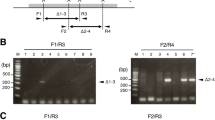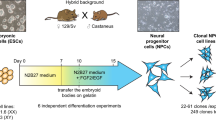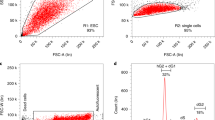Abstract
Embryonic stem cells offer unprecedented opportunities for random or targeted genome alterations in the mouse. We present here an efficient strategy to create chromosome-specific loss of heterozygosity in embryonic stem cells. The combination of this method with genome-wide mutagenesis in ES cells (using chemical mutagens or gene-trap vectors) opens up the possibility for in vitro or in vivo functional screening of recessive mutations in the mouse.
This is a preview of subscription content, access via your institution
Access options
Subscribe to this journal
Receive 12 print issues and online access
$209.00 per year
only $17.42 per issue
Buy this article
- Purchase on Springer Link
- Instant access to full article PDF
Prices may be subject to local taxes which are calculated during checkout


Similar content being viewed by others
References
Mortensen, R.M., Conner, D.A., Chao, S., Geisterfer-Lowrance, A.A. & Seidman, J.G. Mol. Cell. Biol. 12, 2391–2395 (1992).
Paludan, K., Duch, M., Jorgensen, P., Kjeldgaard, N.O. & Pedersen, F.S. Gene 85, 421–426 (1989).
Dufort, D., Schwartz, L., Harpal, K. & Rossant, J. Development 125, 3015–3025 (1998).
Carmeliet, P. et al. Nature 380, 435–439 (1996).
Reaume, A.G. et al. Science 267, 1831–1834 (1995).
Shalaby, F. et al. Cell 89, 981–990 (1997).
Nagy, A., Rossant, J., Nagy, R., Abramow-Newerly, W. & Roder, J.C. Proc. Natl. Acad. Sci. USA 90, 8424–8428 (1993).
Festing, M.F., Simpson, E.M., Davisson, M.T. & Mobraaten, L.E. Mamm. Genome 10, 836 (1999).
Simpson, E.M. et al. Nature Genet. 16, 19–27 (1997).
Threadgill, D.W., Yee, D., Matin, A., Nadeau, J.H. & Magnuson, T. Mamm. Genome 8, 390–393 (1997).
Ang, S.L. & Rossant, J. Cell 78, 561–574 (1994).
Miquerol, L., Gertsenstein, M., Harpal, K., Rossant, J. & Nagy, A. Dev. Biol. 212, 307–322 (1999).
Robinson, W.P. Bioessays 22, 452–459 (2000).
Chen, Y. et al. Nature Genet. 24, 314–317 (2000).
Munroe, R.J. et al. Nature Genet. 24, 318–321 (2000).
Acknowledgements
We thank L. Miquerol for the Vegf knock-in cells, and J. Rossant and members of her lab for the targeted insertions on MMU2, MMU5 and MMU10. This work was supported by a CIHR Centennial Fellowship to L.L. and a grant from CIHR to A.N.
Author information
Authors and Affiliations
Corresponding authors
Rights and permissions
About this article
Cite this article
Lefebvre, L., Dionne, N., Karaskova, J. et al. Selection for transgene homozygosity in embryonic stem cells results in extensive loss of heterozygosity. Nat Genet 27, 257–258 (2001). https://doi.org/10.1038/85808
Received:
Accepted:
Issue Date:
DOI: https://doi.org/10.1038/85808
This article is cited by
-
HLA Engineering of Human Pluripotent Stem Cells
Molecular Therapy (2013)
-
A retroviral strategy that efficiently creates chromosomal deletions in mammalian cells
Nature Methods (2007)
-
Expression and loss of alleles in cultured mouse embryonic fibroblasts and stem cells carrying allelic fluorescent protein genes
BMC Molecular Biology (2006)
-
Current issues in mouse genome engineering
Nature Genetics (2005)
-
Genome-wide phenotype analysis in ES cells by regulated disruption of Bloom's syndrome gene
Nature (2004)



